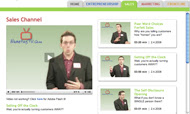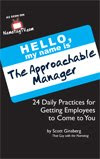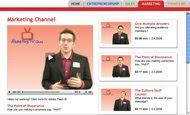 Consistency – despite convenience and comfort – creates uncracked character.
Consistency – despite convenience and comfort – creates uncracked character.
Unfortunately, I can’t teach you (or your company) how to be or stay consistent.
What I can do is give you some questions to ask yourself, your coworkers and your organization that will increase the PROBABILITY of consistency.
Consistency between:
Your choices and your core.
Your decisions and your dominant reality.
Your message and your mentality.
That’s what enables people to TRUST IN you.
Consistency between:
Your actions and your attitude.
Your behavior and your beliefs.
Your bold moves and your brand.
That’s what encourages people to DO BUSINESS WITH you.
Consistency between:
Your practices and your principles.
Your projects and your philosophies.
Your vocation and your values.
That’s what inspires people to FOLLOW AFTER you.
Consistency between:
Your ventures and your visions.
Your situations and your strengths.
Your terminology and your truth.
That’s what impels people to TALK ABOUT you.
Think you would benefit from that? Think your organization would benefit from that?
Cool.
It’s time to run your Consistency Audit™….
The questions below are broken down into seven categories: Purpose, Values, Vision, Identity, Brand, Life and Perception.
Feel free to approach them from an organizational OR an individual level. And if you’d like to have your leaders or staff in your company partake, send them to www.consistencyaudit.com!
1. Consistency of PURPOSE.
Because usefulness is worship. And leaders who are called – not driven – are the ones who make the most change in the world. So, don’t start a business – start a movement. Don’t make money – make history. And don’t do your job – validate your existence.
ASK YOURSELF:
o Am I acting from character and purpose, or is this behavior a coping mechanism to a situation?
o Am I willing to have all decisions judged in accordance with this purpose?
o How does this relate to my life purpose?
o What continually deflects me from my certainty of purpose?
o What is essential to my sense of being on purpose?
o What percentage of my time do I feel that I’m in alignment with my calling?
o What three things am I doing regularly that don’t serve or support my vision, calling or purpose?
o What would REAL fulfillment look like in this area if I were truly living my life purpose?
2. Consistency of VALUES.
Because people buy people first. And customers don’t buy from, trust in, or remain loyal to, companies or organizations; but to people. Also, on an internal level, people don’t quit jobs – they quit people.
ASK YOURSELF:
o Am I on a path that aligns my actions to my values?
o Is this consistent with my values?
o What non-negotiables need to be honored here?
o What could I do differently to better align my responses with my values?
o What values really matter to me enough that I’m willing to sacrifice for them?
o What would I protest publicly?
o Will this action move me closer to honoring my values or further away?
o What obstacles or threats might prevent me from staying consistent to the core vision?
3. Consistency of VISION.
Because imagination is everything. Because the HOW isn’t as important as the WHAT or the WHY. Because, at the risk of sounding cheesy, thoughts really DO become things. Especially when you write those thoughts down.
ASK YOURSELF:
o If everybody did exactly what I said, what would the world look like?
o Is my current action anchored in my vision?
o Is what I’m doing right now consistent with my #1 goal?
o Is what I’m telling people to do right now providing them with the tools they need to build that world I envision?
o On a scale of 1-10, how well does what I’m about to do connect to the overarching vision?
o What can I do to make this agree with my vision?
o What is the most important thing I can do to bring my activities in line with my values and vision?
o What would be most consistent with your vision in this situation?
4. Consistency of IDENTITY,
Because the goal is to bring more of yourself to every experience. To goal is to stay aligned with the working model of your identity. And the goal is to ask yourself, “What would I do in this situation? Ultimately, the goal is to think about what it would look like to “pull a YOU.”
ASK YOURSELF:
o Am I behaving in a manner that is consistent with my self-concept?
o Am I being the ME I always wanted to become?
o How would the person I’m trying to become do what I’m about to do?
o How is this helping me become more of my own adjective?
o If I were ME, what would I do in this situation?
o What does this situation need of me that only I can contribute?
o What would be SO typical of me in this situation?
o What would the earlier version of me do in this situation?
o What behaviors are preventing me from making progress towards becoming the best and highest version of myself?
5. Consistency of BRAND.
Brands are shortcuts. Expectations. Predictable moments of YOU-ness. And the secret isn’t to sell or market or advertise, but rather to transfer the emotion and passion and love of that which is non-average and non-boring.
ASK YOURSELF:
o Are the very first words out of my mouth consistent with my brand?
o How might this become an off-brand choice?
o How will I stamp this with my brand?
o If I decided to do this, would it support my empire?
o Is what I’m doing right now consistent with building my brand?
o What is the extension of my being, and am I exerting it here?
o Will this choice successfully express the personality of my brand?
o What could I say, do or BE – in this situation – that would simultaneously keep me in alignment with my truth, yet position me as the complete opposite of everyone else?
o Will this choice add the necessary blocks to build the brand that I want?
6. Consistency of LIVING.
Because people are listening to your life speak. People are watching what you DO. And the goal is to make your life the work of art, using YOU as the medium. Paint is for amateurs anyway.
ASK YOURSELF:
o Am I currently speaking from a place of personal truth?
o Are my actions predictable and congruent with my stated positions?
o How have I already done and become what I’m about to teach?
o How well is this statement reflected in my life right now?
o Is how I’m behaving right now consistent with the attitude I strive to maintain?
o Is the message I’m currently preaching the dominant reality of my life?
o Is the statement I’m making with my life consistent with my heart?
o What (specifically) do I need to have already done or become in order to confidently preach this message without people questioning my credibility?
7. Consistency of PERCEPTION.
Because what people remember about you is what you are. And that depends on how people experience you. It also depends on how people experience themselves when they’re with you. And it depends on what people think when they see your name.
ASK YOURSELF:
o How deep is the gap between my onstage performance and my backstage reality?
o If I did this, would the result in any way enhance my perception as a jack-of-all-trades?
o If I partook in this experience – and people saw me – would they perceive me as being out of alignment with my true self?
o If I proceeded with this endeavor, would people who know me have ANY question in their mind that it came from me?
o If my best clients and closest friends saw me doing this, would it be seen as a compromise of integrity?
o Once we’re finished with the project, would this client be a good commercial for my business?
o Would I want to become known for what I’m about to do?
– – –
FINAL CHALLENGE: If you completed the audit and noticed more areas of inconsistency then you’d like to have, that’s a good thing.
You don’t have to live your life as a walking contradiction if you don’t want to.
Instead, to bring your inner and outer worlds into harmony, consider these final questions:
1. How far can I deviate before crossing the line that puts me into inconsistent territory?
2. What kind of structure can I place around myself to make sure I remember to do this consistently?
3. What support would I need to have in place in order to remember that I have a choice?
REMEMBER: Nobody can “force” consistency upon you or your organization.
THE GOOD NEWS IS: By running this audit; you great increase the PROBABILITY of being and staying consistent.
Because if there’s one thing I’ve learned from wearing a nametag for the past 3,164 days, it’s that consistency is far better than rare moments of greatness.
LET ME ASK YA THIS…
How much money is being inconsistent costing you?
LET ME SUGGEST THIS…
If you’d like to have your leaders or staff in your company partake in this process, send them to www.consistencyaudit.com!
* * * *
Scott Ginsberg
That Guy with the Nametag
Author, Speaker, Coach, Entrepreneur
[email protected]
Check out Scott’s Online Quotation Database for a bite-sized education on branding success!















